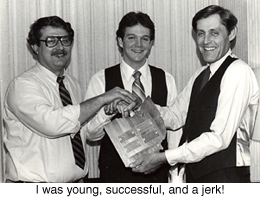{Rant warning – only read this post if you want to risk being needlessly ticked off at me.}
Are you a Responsive Leader? If not, get out. Now. Get off the bus. I mean it. You are killing the rest of us!
One of the ways I describe my work is this: My passion is to save the work world from bad management, one LEADER at a time. I do not do this from theory – I do this out of my experience.

Six years into my career, I was blessed to encounter a boss who smacked me back and said, Stop that! For one really long, intense, and sometimes miserable year, he challenged and re-built my world view around leading people. He was the first of my mentors to teach me the difference between being successful vs effective, and how it was possible to get stuff done AND have fun at work.
I learned to listen to people, and to care and respond to what THEY wanted, versus what I was smart enough to tell them. What I heard led me to challenge many of the conventions of the day (though these feel normal today, it was not the case in the 1980s!).
Over the next decade of my career I continued to make mistakes, but I took a lot of risks and opened up new territory as a result. I ripped time clocks off the walls when I understood how demeaning they were to my teams, and replaced them with trust. I adopted casual dress long before it was normal. I fought the system to allow key managers and professional staff to continue in their roles part-time after childbirth, or to share a leadership job. I pioneered flexible work hours, and faced down gender and age bias because I was the only “guy” who would take it on. And I challenged the suffocating, compliance-based cultures I encountered, helping to build more positive, participative workplaces.
Am I bragging, here? Yeah, ya betcha. I am proud of the role I played 20 years ago in making change in the workplace. At the same time, I am frequently amazed (and even horrified) at how many organizations continue to treat people in ways that the pre-1980 version of me would recognize. “You are a cog. You are disposable. We don’t care about you. Fit in or suffer.” Eeewww!
Because I was responsive, I was not always predictable; some people did not like me or what I did. Yet others followed me with a fierce loyalty precisely because I DID change things up, because I listened and responded with curiosity rather than “explanation.”
My primary tool for change became Conversation. Engaging with others was both a way to learn and a way to teach – and a path to change (and it’s the foundation of all that I do today as a coach).
How do you foster responsiveness in yourself? Do you make the effort to understand what people really need/want, match that to what the organization really needs, and seek a way to meet both sets of needs? Or are you a cookie-cutter manager who expects everyone to fit into the “system” in the same way, which of course makes it easy for you?
Do you ask questions? Do you Listen to the answers? Do you take action, make change, and challenge the system (including yourself) to adapt? Or do you do an annual survey and then spend the next six months explaining how the data is bad, so you won’t have to change anything?
If you are the latter, you are not a leader. You are static. You are expecting the world to adapt to you. Sorry, not gonna happen.
In addition, if you can’t or won’t change, please notice that you’re miserable and you’re making everyone around you miserable, too. Step aside. A new generation of leaders is waiting.
Ask questions. Listen. Create and stay in conversation. Respond.
{That’s the end of my rant. Happy New Year.}
Remember, Leadership is not about a title: Anyone can be a leader who lives in a place of responsiveness, striving to balance the needs of the organization with the needs of the real people who work there.
